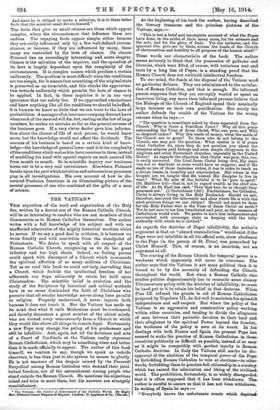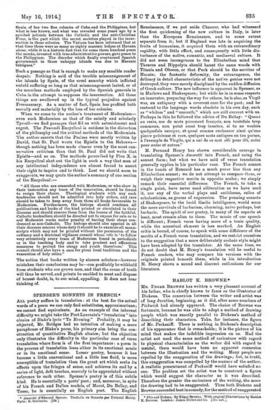THE VATICAN.*
Tam exposition of the work and organization of the Holy See, written by a devout son of the Roman Catholic Church, will be as interesting to readers who are not members of that Communion as to Roman Catholics themselves. The author writes with a full knowledge of his subject and with an unaffected admiration of the mighty historical machine which he serves. If we say a good deal in criticism, it is because we write frankly and with conviction from the standpoint of Protestants. We desire to speak with all respect of the Roman Catholic Church, recognizing as we do her great industry and her high ideals. Indeed, no feeling person could speak with disrespect of a Church which commands the spiritual affection of so many millions of Christians. Yet as we read this book we could not help marvelling that a Church which forbids the intellectual freedom of her adherents can hope ultimately to retain her hold upon Christendom. The scientific belief in evolution and the study of the Scriptures by historical and critical methods Lave in no sense diminished the faith of Christians who perceive that all secular knowledge moves along lines parallel to religion. Properly understood, it never injures faith because it does not touch it. But the Vatican has made up its mind that what it calls Modernism must be condemned, and thereby denounces a great number of the ablest minds, who are turned away unnecessarily from a Church to which they would like above all things to remain loyal. Fortunately a new Pope may change the policy of his predecessor and still be infallible. And, again, not all the decisions and acts of a Court of Cardinale at the Vatican really represent Roman Catholicism, which may be something wiser and better than it is made officially to appear. The author of this book himself, we venture to say, though we speak as outside observers, is less than just to the system he means to glorify. He is not unaware of the despair caused by the Paseendi Encyclical among Roman Catholics who demand their intel- lectual freedom, nor of the astonishment among people who stand outside the Roman Church. He mentions the objections raised and tries to meet them, but Lis answers are strangely unsatisfactory.
• The Vatica. the Centre of Gooemda sot of the Catholic World. By Eight rodmomiCanoas Hague de Hassan. 1...mdos: D. Applatond. Co. Eld,.not..1
At the begiuning of his book the author, having described the literary treasures and the priceless pictures of the. Vatican, says;
"This is but a brief and incomplete account of what the Popes have done, in the midst of their many cares, for the sciences and, the arts, and for the glory of Italy. Yet the sectaries, and the ignorant who give ear to them, accuse the heads of the Church of obscurantism and hostility to all progress of the human mind?'"' These words are characteristic of the book. The author seems seriously to think that the possession of galleries and libraries, which were filled, of course, with -notorious zeal and taste by a long line of Popes, is a standing proof that the Roman Church does not withhold intellectual freedom.
To our mind, the funds at the disposal of the Vatican need no particular defence. They are administered to the satisfac- tion of Roman Catholics, and that is enough. No informed. person supposes that they are corruptly wasted or spent on luxurious living, any more than informed persons believe that the Bishops of the Church of England spend their nominally large incomes on their own gratification. But surely the author defends the wealth of the Vatican for the wrong reasons when Le says :— “ The question is sometimes asked by those separated from the Church Why is there a Pontifical Court ? Why all this pomp- surrounding the Vicar of Jesus Christ, Who was poor, and Who so despised riches Why this waste of money, when the needs of the Church are so great? To those who da not belong to the Church, one may put the question: What matter is it of yours what Catholics do, since they do not question you about the immense salaries paid bishops and even simple clergymen in the Anglican and other Protestant churches, especially in the United' States? As regards the objection that Christ was poor, this, too,. is easily answered. Our Lord Jesus Christ being God, His state was not so destitute as some would have us suppose; and if He made no use of these immense riches, it was in order to teach a divine lesson in humility and renunciation. But where in the. Gospels are we taught that He wished His disciples to live in want? What He asks of the faithful is to be 'poor in spirit' (St. Matthew 5:3)—that is, not to regard wealth as the chief aim' of life. As St. Paul has raid, ' They that bny, be as though they possessed not.' (1 Corinthians 7:30.) Furthermore, for Catholics, Christ is always living in the Holy Euelimist. Should we not,. thereto's, surround the tabernacle and altar where He is with the- most precious things we can obtain? Should not mach be done for the Holy Father who is the Vicar of Jesus Christ on earth is We do not care to see him humiliated and poor, as the enemies of. Catholicism would wish. We prefer to have him independentand surrounded with sovereign state in keeping with the lofty authority with which he is clothed."
As regards the doctrine of Papal infallibility, the author's argument is that an " absurd contradiction " would exist if the. Pope were not infallible in all his official acts, since obedience-- to the Pope (in the person of St. Peter) was prescribed by Christ Himself. This, of comae, is an assertion, not an argument at all The craving of the Roman Church for temporal power is a weakness which apparently, will never be overcome. The author says that the Vatican is not more political than it is bound to be by the necessity of defending the Church throughout the world. But when a Roman Catholic who studies politica dispassionately has to reconcile some clumsy Ultramontatte policy with the doctrine of infallibility, he must. be bard put to it to retain his belief in that doctrine. When Pius IX. refused the grants in aid of Roman Catholicism proposed by Napoleon III., he did well to maintain his splendid independence and self-respect. But where the policy of the- Vatican is an aggressive and constructive policy working within other countries, and tending to divide the allegiance. of men between their patriotic devotion to their land and their allegiance to the spiritual Power beyond the frontier, the weakness of the policy is seen at its worst. In Lis dealings with both France and Spain the present Pope has seemed to make the practice of Roman Catholicism in thaw countries politically as difficult as possible, instead of as easy. as it might be compatibly with perfect loyalty to Roman Catholic doctrine. In Italy the Vatican still marks its dis- approval of the abolition of the temporal power of the Pope by forbidding Roman Catholics to vote at elections—in other, words, forbidding them to practise full citizenship in a country, which has earned the admiration and liking of the civilized. world. The prohibition, fortunately, is so widely disregarded; that it is often supposed that it has been withdrawn. The. author is careful to assure ns that it bas not been withdrawn. In writing of Spain he says:— "Everybody knows the unfortunate events which deprive& ;Spain of her two fine colonies of Cuba and the Philippines, but what is less known, and what was revealed some years ago by a spirited polemic between the Catholic mid the anti-Christian Press, is the part which the secret societies played in the insur- rection in those colonies. The Vatican has been informed that at hat time there were as many as eighty masonic lodges at Havana alone, while it is a historic fact that for some three hundred years the monks, invested with true administrative powers, gave peace to the Philippines. The disorder which finally overturned Spanish government in those unhappy islands was due to Masonic Intrigues."
such a passage as that is enough to make any sensible reader despair. Nothing is said of the terrible mismanagement of the islands by Spain, of the cruel anarchy which inflicted untold suffering so long as that mismanagement lasted, or of the merciless methods employed by the Spanish generals in Cuba in the attempt to suppress the insurrection. All these things are - swallowed up in the typical prejudice against
Freemasonry. As a matter of fact, Spain has profited both morally and materially by the loss of her colonies.
When we come to the author's treatment of Modernism— even such Modernism as that of the saintly and scholarly Tyrrell—we find passages that fill us with astonishment and
regret. The Pascendi Encyclical is outdone in the distortion of the philosophy and the critical methods of the Modernists.
The author asserts that the Psalms were mostly written by David, that St. Paul wrote the Epistle to the Hebrews—
though nothing has been made dearer even by the moat con- servative criticism than that St. Paul did not write that Epistle—and so on. The methods prescribed by Pins X. in his Encyclical shut out the light in such a way that men of any intellectual independence are almost forced to assert their right to inquire and to think. Lest we should seem to exaggerate, we may quote the author's summary of one section of the Encyclical:—
"All those who are connected with Modernism, or who show in their instruction any trace of the innovation, should be forced to resign their chairs. Theological students with any such tendencies should not be admitted into holy orders, and care should be taken to keep away from them all books favourable to Modernism. Furthermore, the bishops should condemn all publications and books of the kind printed or circulated in their dioceses and should remove them from the homes of the faithful. Catholic booksellers should be directed not to expose for sale or to sell Modernist works under penalty of having their shops con- demned as non-Catholic. The bishops should also appoint in all their dioceses censors whose duty it should be to examine all manu- scripts which may not be printed without the permission of the ordinary and a doctrinal vigilance council whose rdle is 'to follow very attentively every trace of Modernism found in periodicals or in the teaching body and to take prudent and efficacious measures to protect the clergy and youth therefrom.' This council should also have a care for pious local traditions and the veneration of holy relics."
The notion that books written by sincere scholars—however mistaken their conclusions may be—con profitably be withheld from students who are grown men, and that the cause of truth will thus be served, and priests be enabled to meet and dispose of honest doubt, is, to our mind, appalling. It does not Lear thinking of.











































 Previous page
Previous page